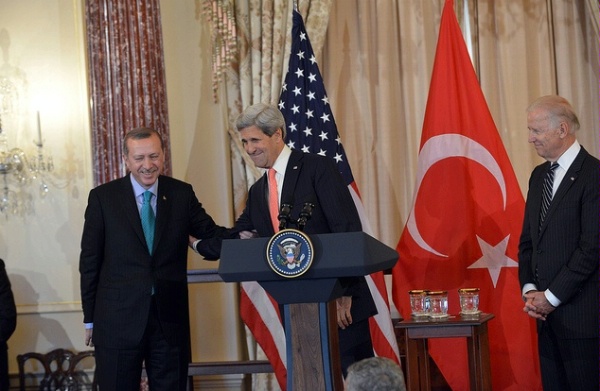
Bloomberg View’s Marc Champion argues that the behavior of Turkish Prime Minister Recep Tayyip Erdogan amid spreading protests draws more on a Russian than a Middle Eastern model of leadership. His point is well taken, but as a Middle East specialist it is hard to miss the parallels between the grievances of Turkish protestors and those voiced by Egyptians demonstrating against President Mohamed Morsi episodically since he forced through a controversial constitution in late 2012.
In Turkey and Egypt, the core grievance is that an elected Islamist leader has adopted a strongly majoritarian approach to democracy—I won the elections and therefore I get to dictate—and has made little attempt to accommodate the desires of large secular minorities within the country. Erdogan and Morsi also are accused of using undemocratic measures to silence or at least intimidate critics in the news media and civil society; Egypt sentenced dozens of N.G.O. workers, including Americans, to prison for democracy work on June 4. Erdogan and Morsi have denigrated the integrity of protestors, as criticized leaders often do, but both have also adopted a particular tactic of claiming that it is not what they do as leaders that has provoked dissent but rather what they are—Islamists—and therefore there is no point in their addressing the complaints of those who protest.
For the United States, the problem is that there are significant shared security interests with these countries (Turkey a NATO ally, Egypt an anchor of Israel’s security), but also a fear that they will become hollowed-out democracies that hold elections but repress liberties, and therefore will be prone to ongoing unrest. The Obama administration should abandon its hand-wringing and start treating these Islamist leaders as adults, stating privately and publicly that we agree with them on many issues (Syria, Sinai) but disagree with their undemocratic behavior. We can’t control what these leaders do in most cases, but they will not admire or heed us more for abandoning our principles.
Michele Dunne is director of the Rafik Hariri Center for the Middle East. This piece first appeared in the New York Times’ Room for Debate, in response to following question: How should the United States respond to the Turkish government’s reaction to dissent?. Photo Credit.
Image: Erdogan%20Kerry%20Biden.jpg
